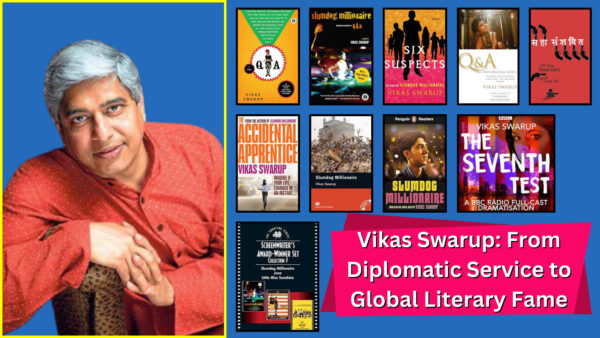
Vikas Swarup: From Diplomatic Service to Global Literary Fame
The Unlikely Journey of a Diplomat Turned Novelist
Vikas Swarup, a retired Indian diplomat and celebrated author, is a name that resonates with literary enthusiasts and film buffs alike. Best known for his debut novel Q & A, which inspired the Oscar-winning film Slumdog Millionaire, Swarup’s journey from the corridors of diplomacy to the world of literature is nothing short of remarkable. Born on June 22, 1961, Swarup served in the Indian Foreign Service (IFS) for over three decades, holding significant diplomatic positions across various countries. However, it was his passion for writing that ultimately propelled him into the global spotlight.
In this article, we take a closer look at the life of Vikas Swarup, his illustrious diplomatic career, his literary achievements, and how his storytelling continues to captivate readers worldwide.
A Diplomatic Career Spanning the Globe
Vikas Swarup’s career in diplomacy began in 1986 when he joined the Indian Foreign Service. Over the years, Swarup held key diplomatic positions in several countries, gaining valuable experience that would later influence his writing. His tenure in these diverse regions exposed him to a wealth of cultures, ideologies, and political dynamics, providing him with a unique perspective on the world.
Swarup’s diplomatic journey took him to some of the most significant posts within the IFS, including stints in Turkey, the United States, Ethiopia, the United Kingdom, South Africa, and Japan. Each of these assignments allowed him to develop a deep understanding of global affairs and the intricacies of international relations.
His most notable positions included his tenure as India’s High Commissioner to Canada, where he played a crucial role in strengthening bilateral relations between the two countries. Additionally, Swarup served as Secretary (West) in the Ministry of External Affairs, where he was responsible for overseeing India’s foreign relations with countries in the West, including Europe and North America.
Throughout his diplomatic career, Swarup maintained a keen interest in global geopolitics. His exposure to different cultures and political systems gave him an in-depth understanding of the challenges and opportunities facing the world. However, it was his passion for storytelling that would eventually lead him to new heights of success.
The Literary Leap: Q & A and Its Global Impact
While stationed in London between 2000 and 2003, Vikas Swarup began to explore his literary aspirations. It was during this time that his debut novel, Q & A, took shape. Inspired by the rise in popularity of quiz shows like Kaun Banega Crorepati in India, Swarup sought to create a story that explored the power of life experiences, questioning societal norms and hierarchies. He envisioned a narrative that would challenge the idea that formal education was the only means of acquiring knowledge and wisdom.
Q & A tells the story of Ram Mohammad Thomas, a young man from the slums of Mumbai, who wins a fortune on a quiz show. The novel explores the deeply ingrained social divisions in India, where education, class, and caste determine one’s value in society. The protagonist, who has little formal education, becomes the subject of scrutiny as his incredible success raises questions about his worthiness. The novel weaves together suspense, social commentary, and a touching exploration of human resilience.
Even before Q & A was officially published, the manuscript was optioned for a film, and the rest, as they say, is history. The book was published in 2005, and it was soon translated into 37 languages, reaching a global audience and earning widespread acclaim. The novel’s success was further amplified by its adaptation into the 2008 film Slumdog Millionaire, directed by Danny Boyle.
Slumdog Millionaire was a massive success, winning eight Academy Awards, including Best Picture, Best Director, and Best Adapted Screenplay. The film’s triumph brought Vikas Swarup’s story to an even wider audience and established him as a globally recognized author. While the film differed in some aspects from the novel, it retained the essence of Swarup’s exploration of human resilience, the power of fate, and the ways in which life experiences shape our understanding of the world.
Swarup’s success with Q & A and its adaptation into Slumdog Millionaire marked a turning point in his life. Not only had he achieved critical acclaim as a writer, but he had also contributed to the creation of one of the most successful films in recent history. The novel and its film adaptation served as a testament to the power of storytelling and its ability to transcend cultural and geographical boundaries.
The Social Thriller: Six Suspects and The Accidental Apprentice
Following the success of Q & A and Slumdog Millionaire, Vikas Swarup continued to write novels that combined suspense with deeper social themes. His second novel, Six Suspects (2008), is a gripping tale that explores issues of corruption, class struggle, and the power of influence. The novel is set against the backdrop of a high-profile murder and follows multiple characters with complex motives, each of whom could be the killer.
The book delves into the intricacies of the Indian political and social systems, touching on themes of power, privilege, and the lengths to which individuals will go to protect their interests. Swarup’s mastery of suspenseful storytelling is evident in Six Suspects, which blends intrigue with social commentary, a hallmark of his writing style.
Swarup’s third novel, The Accidental Apprentice (2013), further cemented his reputation as a master of the “social thriller” genre. The novel follows the story of Sapna Soni, a young woman from a modest background who is thrust into the cutthroat world of corporate India. The book explores themes of corporate greed, the pursuit of power, and the ethical dilemmas faced by individuals in positions of influence.
Through both of these novels, Swarup has demonstrated his ability to weave complex narratives that explore contemporary issues while keeping readers on the edge of their seats. His works have been praised for their ability to blend suspense with social critique, providing both an engaging read and a thought-provoking examination of society.
Literature as a Tool for Change
For Vikas Swarup, literature is more than just a form of entertainment; it is a tool for change. Throughout his career, Swarup has used his writing to explore social issues and challenge societal norms. His novels tackle themes such as class inequality, corruption, and the power of education, offering readers a glimpse into the realities of life in India and beyond.
Swarup has also contributed to several anthologies that support important causes. For instance, he has written for anthologies aimed at supporting organizations like Save the Children, demonstrating his commitment to using his platform as an author to contribute to social good.
In addition to his literary work, Swarup’s career in diplomacy also reflects his belief in the power of global cooperation and understanding. As a diplomat, he played a key role in fostering relationships between India and other nations, and his experiences in international relations have undoubtedly influenced his writing. He believes that storytelling, whether through literature or diplomacy, can bridge cultural divides and promote greater understanding between people from different walks of life.
Retirement and Future Projects
After retiring from the Indian Foreign Service, Vikas Swarup has continued to focus on his writing. While he has not yet revealed his next project, Swarup has hinted that he is contemplating both fiction and non-fiction works. Given his passion for global geopolitics, it is likely that his future works will continue to explore the intersection of politics, society, and the human condition.
Despite his diplomatic career’s conclusion, Swarup’s love for storytelling remains unwavering. He has often spoken about how writing provides him with a sense of fulfillment and purpose. Whether through novels, short stories, or essays, Swarup’s ability to captivate audiences with his insights into human nature will continue to leave a lasting impact on the literary world.
A Legacy of Storytelling and Diplomacy
Vikas Swarup’s journey is a testament to the power of diverse experiences in shaping one’s creative vision. From his early years in diplomacy to his rise as an acclaimed novelist, Swarup has proven that compelling stories can emerge from a variety of life experiences. His work, whether in diplomacy or literature, continues to inspire readers and encourage them to think critically about the world around them.
With his debut novel Q & A and its subsequent adaptation into Slumdog Millionaire, Swarup has left an indelible mark on both the literary and film industries. As he looks toward future projects, there is no doubt that his storytelling will continue to shape conversations on social issues and human resilience for years to come.
In a world where both diplomacy and literature can serve as powerful vehicles for change, Vikas Swarup’s legacy is a reminder that the most compelling stories often come from the most unexpected places.

Continuing the achievement of the journey of effectiveness and credibility of more than 10 years in the career of journalism, as a woman journalist, I am Serving as the founder, promoter and editor of DiaryTimes with the trust and support of all. My credible coverage may not have given a big shape to the numbers, but my journey presents articles that make you aware of the exact and meaningful situations of Himachal’s politics, ground issues related to the public, business, tourism and the difficult geographical conditions of the state and financial awareness. DiaryTimes, full of the experience of my precise editorial expertise, is awakening the flame of credible journalism among all of you, so that the eternal flame of meaningful change can be lit in the life of the people of the state and the atrocities being committed against the people can be brought to the fore, I am motivated for that. If even a small change comes with the power of my journalism and the whole world becomes a witness to that issues, then I will consider myself fortunate.





